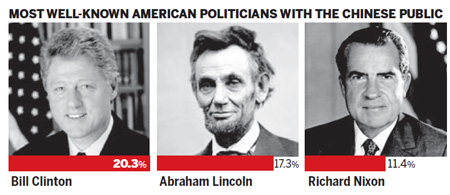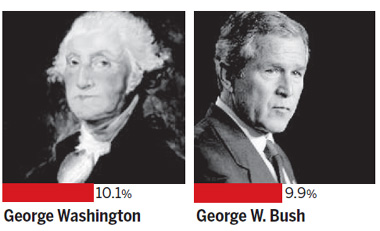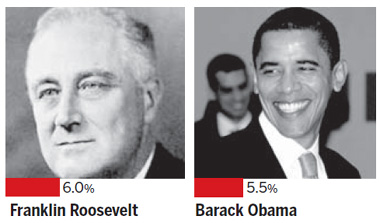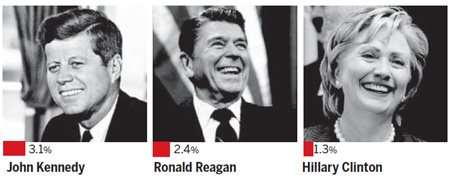Focus
'Friction inevitable as bonds grow stronger'
By Ding Qingfen (China Daily)
Updated: 2011-01-17 08:04
 |
Large Medium Small |
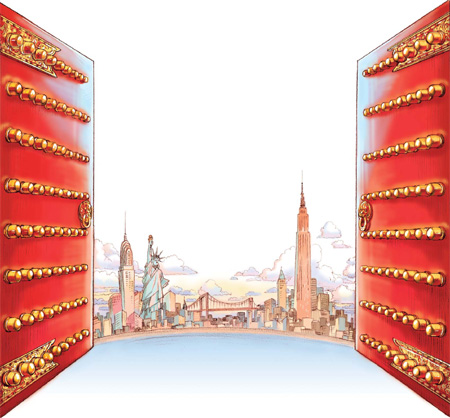
Experts hail growing culture of cooperation between China and the US, but warn that closer ties do not rule out possible strains in the relationship. A survey, which was conducted by China Daily and Horizon Research Consultancy Group and took a sample of 1,443 citizens in seven major cities across China, shows how Chinese people feel about the US. Ding Qingfen reports in Beijing.
Economic and trade relations between China and the United States, the world's top two economies, are "cooperative" but also "competitive", shows a survey by Horizon Research Consultancy Group. Th e survey, which was jointly conducted by China Daily and Horizon, a leading Chinese strategic research and consultancy fi rm, comes ahead of Chinese President Hu Jintao's state visit to the US starting on Tuesday. According to the survey, entitled "The US in the Eyes of Chinese", 69.9 percent of interviewees said the two economies are not only competing against each other, but also cooperating with each other.
"Such public opinion well reflects the current situation regarding bilateral economic relations," according to a report on the survey's findings.
Among those polled who have traveled to the US, 83.3 percent agreed with the above statement, 12.1 percentage points higher than those who have not visited the US.
During the past year, the US and China have been embroiled in trade conflicts with each other.
The US has been pressing China to allow its currency to rise as US congressmen claimed that China undervalued its currency which was putting US players at a disadvantage.
Meanwhile, the US has been frequently launching trade remedy cases against imports from China, including those in the clean energy sector.
But many economists believe cooperation remains the dominant theme of bilateral economic relations and, although there are still conflicts, the two economies need each other.
US Commerce Secretary Gary Locke said last Thursday that the US and China must seize the opportunities offered by cooperation.
US Treasury Secretary Timothy Geithner said in Washington that even though China and the US compete in many areas, their economic strengths are largely "complementary".
But looking ahead, experts said that while bilateral economic cooperation strengthens, conflicts will "further grow".
"The more business opportunities and the more cooperation, the more friction," said Wang Yizhou, vice-chairman of the school of international studies at Peking University.
The survey also revealed that 61.3 percent of interviewees insisted China has made a bigger contribution to the world economic recovery since the financial crisis than the US. Meanwhile, only 10.3 percent said the US has played a bigger role.
While China surpassed Japan to become the second-largest economy in 2010, a growing number of Chinese think that the nation's economy can eventually occupy the global top spot.
The survey found 70 percent believe the Chinese economy will overtake the US someday, and 53.5 percent said this would happen within 20 years.
Although there is possibility that the Chinese economy may eventually outrank that of the US, experts said they are more worried about the quality of the Chinese economy and per capita GDP.
And as for climate change, 41.8 percent of interviewees said China has made great efforts to combat it, 8 percentage points higher than the US.
Bilateral investment
In terms of investment, the Chinese public has an open attitude, with 52.7 percent saying the Chinese government should encourage more Chinese enterprises and individuals to invest in the US, and 44.4 percent saying that American companies and individuals should invest more in China.
"Despite the restrictions set by the US, Chinese companies should invest more in the US not only to expand and upgrade their technology but also to create more jobs there and reduce trade frictions with the US," said Wu Xinbo, deputy dean of the school of international relations and public affairs at Fudan University.
He Weiwen, a council member of the Beijing-based think tank China Society for American Economic Study, agreed. "More Chinese investment in the US could be the core of bilateral economic cooperation," he said.
During the past year, some Chinese investment projects were turned down or doubts were cast over them for security reasons, but He said more Chinese investment could help narrow the nation's trade surplus with the US, which has been the focus of China-US friction.
"Supposing Chinese investment in the US could surpass $100 billion in five years, or equal half of the Japanese investment in the US, about 300,000 to 500,000 job opportunities could be created," he explained.
The survey also showed 34 percent of interviewees said the US investment in China should be reduced. This view was stronger among young people, with 44.4 percent of those under 30 taking this stance.
"This indicates the youth in China expects the nation to develop by itself and reduce its reliance on the foreign investment," said the survey.
Wu disagreed, adding "China should be welcoming investment from the US, but the US investment should be directed into sectors that assist China to transform its economic development mode."
The Chinese government has been reiterating that the nation is open to foreign investment and is taking measures to create a fairer and more transparent business environment.
From January to November 2010, US investment in China increased 17.9 percent year-on-year to $2.64 billion.

